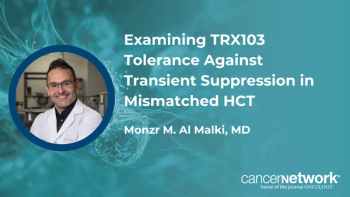
Daratumumab May Exert Indirect Effects on Multiple Myeloma
Dr. Amitkumar Mehta talks about the various effects of daratumumab on multiple myeloma cells.
Today we are speaking with Amitkumar Mehta, assistant professor of hematology and oncology, and a researcher at the Comprehensive Cancer Center University of Alabama at Birmingham about the potential for the anti-CD38 antibody, daratumumab [Darzalex], which is a relatively novel therapy approved for previously treated, late-stage multiple myeloma patients, to have broader effect, not just as a cytotoxic therapy that blocks the activity of CD38-expressing myeloma cells, but also as a modulator of the immune system.
-Interviewed by Anna Azvolinsky, PhD
OncoTherapy Network: First, can you talk about the known mechanism of action of daratumumab and also how it is currently used to treat multiple myeloma?
Dr. Mehta: Sure. Daratumumab is an anti-CD38 IgG1 monoclonal antibody and it is the first monoclonal antibody to be approved for the treatment of relapsed, refractory multiple myeloma. There have been preclinical studies about a decade ago that showed that targeting CD38 might be feasible. Last November there were two clinical trials that showed significant activity of single-agent daratumumab that led to the FDA approval of this drug. There were two clinical trials. One was a phase I with an expansion phase 2 GEN501 study and the other was the SIRIUS phase II. In both studies, daratumumab showed a single-agent activity of around 30% overall response rate which is more than any other previous single-agent proteasome inhibitor or immune-modulator drug. So it has shown promising activity to target CD38. Now, the effect of daratumumab is through three different mechanisms. First, is through what we call ADCC, that is antibody-dependent cytotoxic activity. Second, is what we call complement-dependent cytotoxicity and the third is antibody-dependent cellular phagocytosis. Apart from that, there is some new activity that is immune-directed that we will discuss.
OncoTherapy Network: Yes, so what you are referring to is a study published in the journal
Dr. Mehta: Sure. This was a very interesting study that was recently published in the journal Blood. This study tells us about the importance of biomarkers in a study. Nearly all studies collect biological samples, including biopsies, so that we have an idea of why the drug works or in whom the drug works and whether we have biomarkers that we can relate to the drug. In this elegant work, the authors, and as a part of the GEN501 study, the peripheral blood and bone marrow samples of these patients were collected before and after treatment and during the trial, and also at the time of progression. The samples were analyzed for different immune factors and assessed for functional activity of the immune cells. And the authors looked at the microenviroment and various T cells and immune cells, and saw the effect of daratumumab in these patients.
OncoTherapy Network: Based on this work, what further studies or trials would you like to see next on this newly identified activity?
Dr. Mehta: So before I go there, let me describe exactly what the authors found and why it was very interesting and surprising.
So, in the current era of immune therapies, especially when we see the cytotoxic T-lymphocyte-associated antigen 4, like CTLA-4 antibodies and programmed cell death 1, PD-1 and PD-L1 antibodies we have seen across solid tumors and different hematological malignancies, especially Hodgkin lymphoma, significant activity of this immune mobilization against cancer. We know from previous studies, that in multiple myeloma also has immune dysfunction which includes immune evasion through various expression of various immune checkpoints, elevated immune receptors and activity, and immune suppression through myeloid-derived suppressor cells. What the authors found here is first of all, that the other immune cells, like regulatory B cells, myeloid-derived suppressor cells (MDSCs), and also a novel T-regulator cell expressing CD38 that they found were prohibiting the immune action on these multiple myeloma cells. What they found was that daratumumab helped improve the tumor microenvironment by enhancing the immune response. So daratumumab actually reduced T-regulator cells, MDSCs and B-regulatory cells at the same time that it helped expand helper and cytotoxic T cells. The authors’ elegant work also showed that not only was there expansion of the effector and helper T cells, but there was also an increase of functional activity of these cells. These immune cells had more alloreactive functions and the authors confirmed that these cells were clonal by using a T-cell clonality assay.
So in this setting, what I see a similar thing as we see with immune checkpoint inhibitors, which is immune enhancement. The importance of daratumumab here is that it also targets CD38-positive plasma cells, so you also get rid of the tumor cells. So this is dual action-the tumor is targeted and there is immune enhancement against the tumor. So this is a very elegant action of proimmune system against the tumor cells. So it’s a no-brainer that we should combine checkpoint inhibitors to see if this immune enhancement is stronger towards the myeloma cells, that is first. Also, pomalidomide and thalidomide, which are immune-modulating drugs, that are the standard or backbone of myeloma treatment, there is the question of whether a combination with these drugs may enhance the immune action against myeloma cells. And the third and most important strategy is to try and go into earlier stages myeloma, like MGUS [monoclonal gammopathy of undetermined significance] or smoldering myeloma, and use this antibody to see if we can mobilize the immune system in a way that we can get longer antimyeloma control.
OncoTherapy Network: Is there potential to use this antibody for other hematological malignancies or solid tumors?
Dr. Mehta: That is a great question. I think that is the way I see the future. If this antibody is mobilizing the immune system in a way that it reduces the B- and T-regulatory cells [that inhibit T-cell function] and MDSCs, whether it can be another immune checkpoint inhibitor and whether we can combine it with other antibodies or cytotoxic therapies in various other solid tumors is [an open question]. I see that in the future we will see these types of studies with daratumumab.
OncoTherapy Network: Thank you so much for joining us today, Dr. Mehta.
Dr. Mehta: Sure, thank you so much.
Newsletter
Stay up to date on recent advances in the multidisciplinary approach to cancer.
Related Content















































